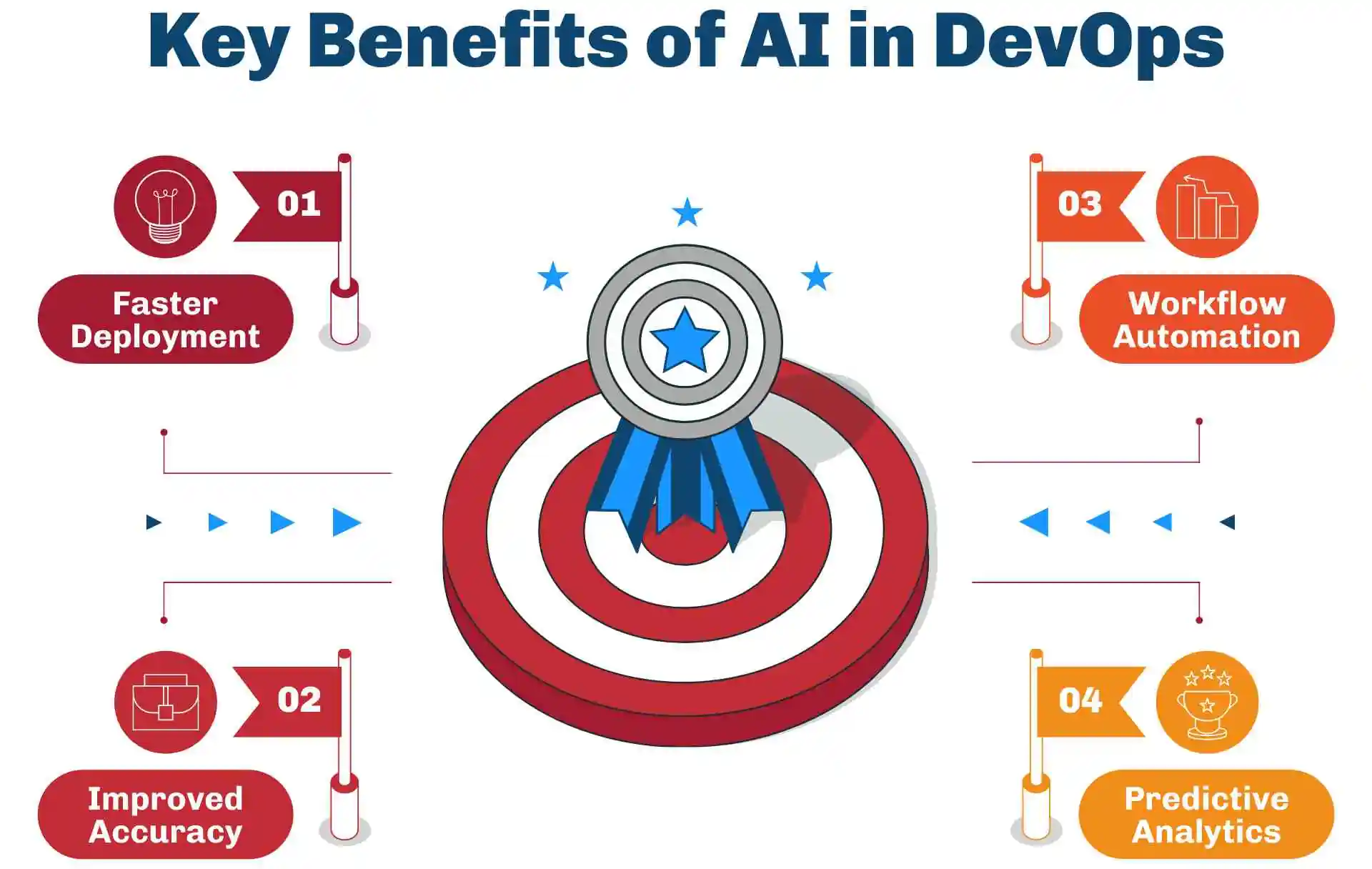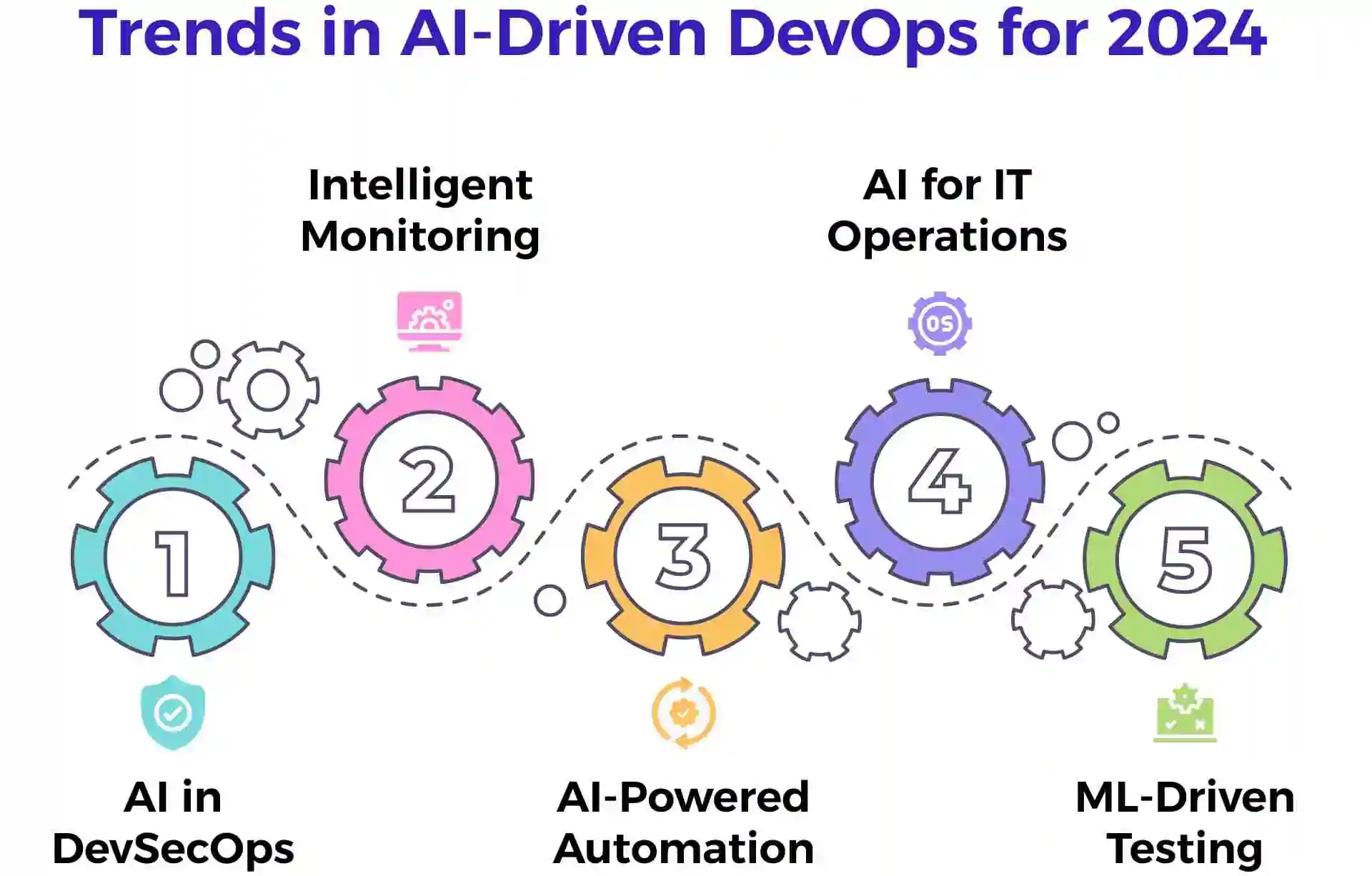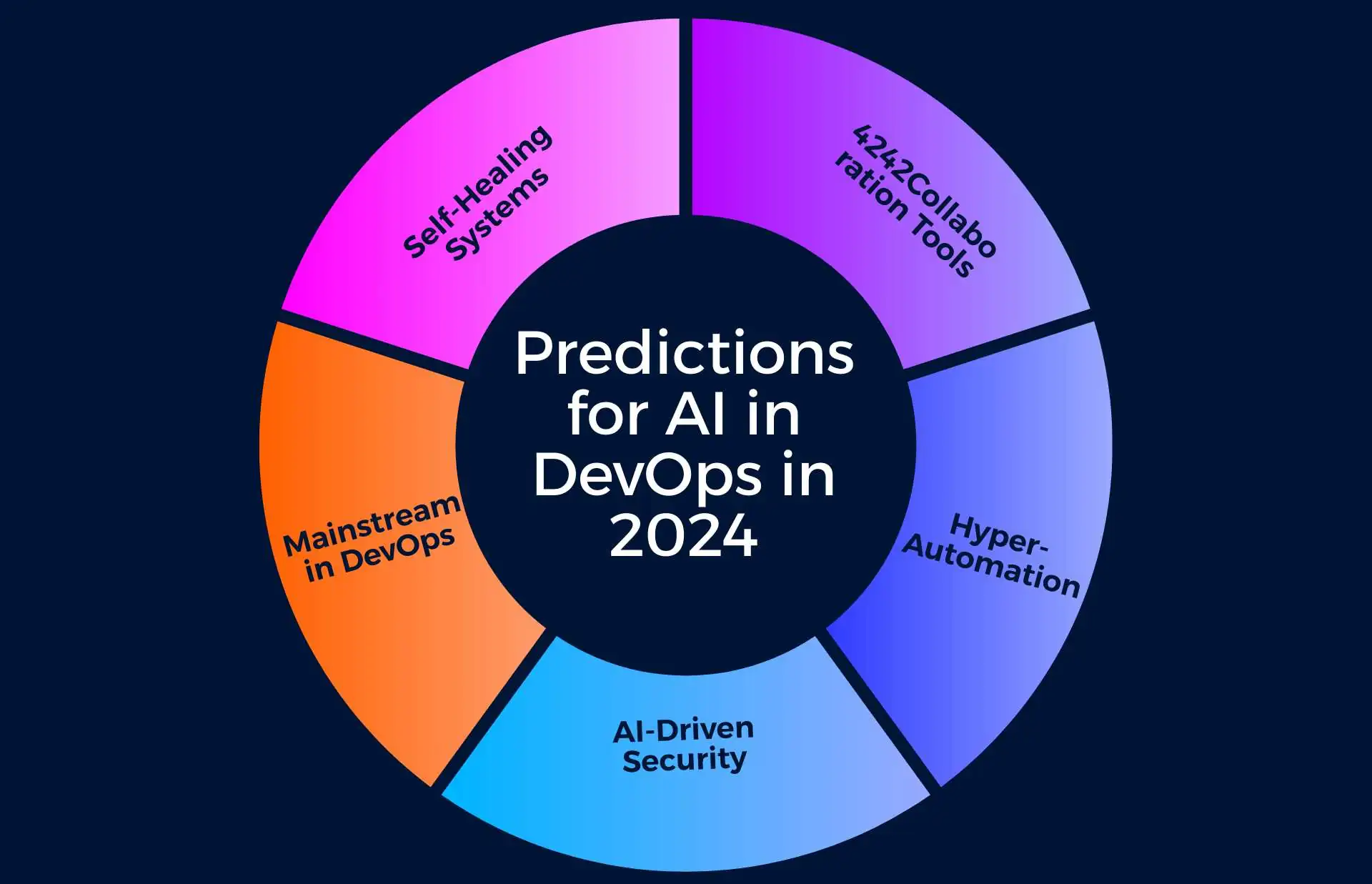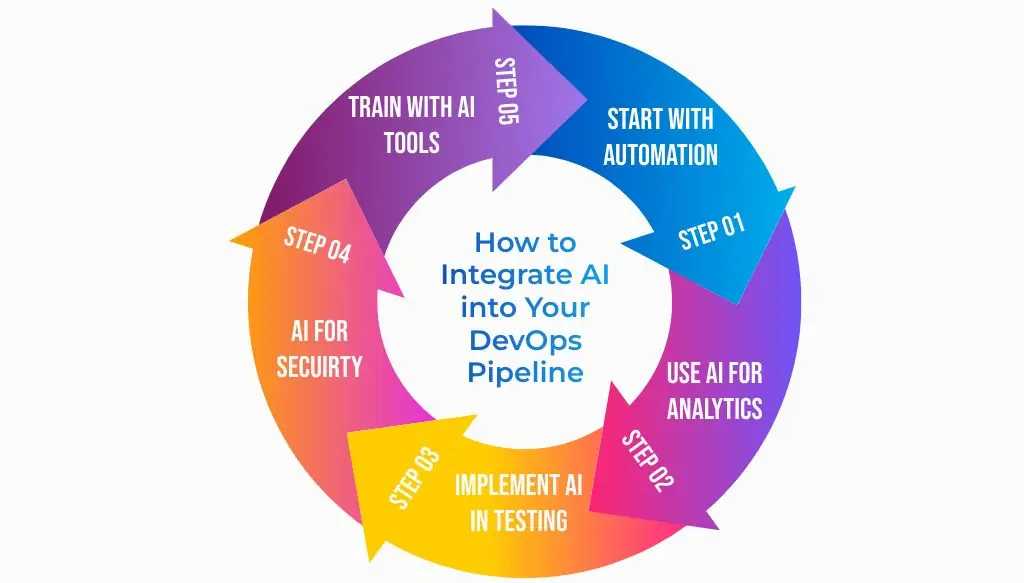Introduction
AI in DevOps is still a dilemma for many. It is hard to predict how deeply AI can integrate into software development operations, but for now, we know that it has the potential to reduce the software development lifecycle by 50%. AI and DevOps integration is now considered to be the future of efficient, error-free software delivery.
Even for software development companies, AI in DevOps is a new concept that is changing the face of the software development process. As these technologies mix together, they are redesigning how software developers write, test, and release code at a velocity previously unseen.
This article discusses the future of DevOps and DevOps trends in 2024 through the lens of AI and goes further to outline new trends in the software development field.
Learn how the application of AI improves DevOps practices, increasing its value. Discover what is on the horizon of DevOps AI predictions and how it will endure further advancements in the course of the year.
What is DevOps? A Quick Overview
Definition:
DevOps is a cultural shift where accountability and breakdown of responsibilities start from application development and then progress through the IT department to deployment and maintenance.
Importance of DevOps:
DevOps is a practice of adopting cross-functional collaboration to build and release (double delivery) software to meet or beat business requirements. It’s simple and concise and cannot be overemphasized for businesses looking to stay top of mind in today’s digital world.
Faster Time-to-Market:
The benefit of DevOps is that it bridges the gap and makes the software delivery process faster. It helps businesses react at the minute’s notice to the demand of the market and try to stay in front of their competitors.
Improved Collaboration:
The DevOps philosophy allows pulling together development and operations teams into one culture that takes responsibility. The result of that increased collaboration is better communication, quicker problem-solving, and more innovative solutions.
Enhanced Quality and Reliability:
With DevOps, issues are caught earlier in the development cycle using continuous integration and automated testing. This improves software release quality, reduces downtime, and increases customer satisfaction.
Increased Efficiency and Cost Savings:
DevOps reduces operational costs by a big margin by automating routine jobs and well managing the resources. But it also contributes to increasing productivity, as teams can focus on high-value work rather than on error-prone manual work.
Challenges in Traditional DevOps:
Traditional DevOps undergoes three major challenges, which include breaching bottlenecks through such areas as manual procedures, mixed environments, and cycle feedback. They may slow down the speed of developing software that is functional and always correct.
Manual Processes and Human Error:
Most of the DevOps remain traditional, relying on manual interventions for the deployment and configurations. It heightens the chance of human errors resulting in inconsistent environments across development and arising production problems.
Lack of Standardization:
Not all teams follow the same processes or tools. The result is a source of integration problems, knowledge-sharing problems, and issues with maintaining and scaling systems.
Limited Visibility and Monitoring:
DevOps traditionally struggles with monitoring across the entire application lifecycle. Lack of visibility in this situation makes it possible to miss issue detection, slow response time, as well as root causes of the problem.
Slow Feedback Loops:
So feedback from production to development can be slow and may be somewhat fragmented in traditional DevOps. Receiving and acting on this critical information can be delayed, resulting in prolonged issue resolution times and missed opportunities to improve.
How AI in DevOps Addresses These Challenges
AI development solutions reduce manual functions, identify possibilities of future problems, and demonstrate possible solutions. Artificial intelligence in DevOps eliminates redundancies and human interface and shortens the time it takes to produce these products.
The Role of AI in DevOps
AI in DevOps has caused a shift in the paradigm because it is now offering intelligent automation, analytics, and learning. AI-powered software deployment has revolutionized how teams build, integrate, deliver, and sustain applications.
AI in DevOps: An Overview:
AI brings iterative changes in the DevOps environment through automation, algorithms, and probabilities. AI DevOps tools enhance process flow, enhance code, and speed up deployment, making the delivery of the software better and more efficient.
Key Benefits of AI in DevOps:
Faster Deployment:
AI helps to speed up deployment by bringing automation to the processes, deciding the optimal distribution of resources needed, and predicting potential issues. DevOps automation with AI leads to quicker time to bring new features and enhancements to the market.
Improved Accuracy:
One of the significant benefits of AI in DevOps is that it identifies bugs early in the code development cycle, hence minimizing what is produced in the market in terms of quality and sustainability.
Automation of Repetitive Tasks:
AI manages logistical decision-making such as code assessment, testing, and management of infrastructure; decisions traditionally tacking development time developers can now spend on more valuable business processes.
Predictive Analytics:
The ability of the use of AI to analyze past events and opportunities as well as possible problems, which may be avoided or minimized in advance, helps to eliminate breakdowns and reduce losses due to the planning of maintenance and other activities.
AI In DevOps Trends for 2024
For DevOps, AI technologies have been shown to be the new elixir. DevOps and AI — they’re transforming how software is developed, and that’s where the change is happening. The DevOps trends in 2024 have been identified as follows:
Trend 1: AI-Powered Automation:
AI has taken the nature of automation in DevOps to a higher level, managing different processes and improving CI/CD. Some examples of such AI DevOps tools are currently being offered by Jenkins X and GitHub Copilot.
Trend 2: AIOps (AI for IT Operations):
AIOps generally replaced technology, which has become a general trend in use for areas such as faster detection, analysis, and response to incidents. At the front end, some of these platforms, like Splunk and Dynatrace, fall into this category.
Trend 3: Machine Learning-Driven Testing:
AI in DevOps is truly innovative testing with the smart generation of test automation and the capability to detect errors in advance. Some of these tools that are practicing this approach include Mabl and Testim.
Trend 4: Intelligent Monitoring and Observability:
AI-powered security workflows make it easier to monitor and ‘observe’ a system in real time and alert stakeholders when something is wrong. Some tools that have used this trend include Datadog and New Relic.
Trend 5: AI in DevSecOps:
DevOps machine learning and AI are supporting improving security in DevOps pipes for proper and faster threat identification and management. This emerging new trend of AI-driven DevOps security solutions is well exemplified by what Deepfence is and is going.
Predictions for AI in DevOps for 2024
Prediction 1: AI Will Become Mainstream in DevOps:
The optional will become mandatory with the predictions of utilizing AI in DevOps in the year 2024. Recent research predicts over 50% dominance of AI in DevOps deployment in the coming days.
Prediction 2: Extended Focus on AI-Driven Security:
AI is primed to greatly help with protecting DevOps pipelines, most importantly regarding heteroarchical, hybrid cloud environments, through threat identification and mitigation being fully automated.
Prediction 3: AI Will Drive Hyper-Automation in DevOps:
AI in DevOps will take the process of automation to a higher level, where people will be kept out of the process as much as possible, starting from planning to development, testing, deployment, and even monitoring phases.
Prediction 4: AI to Enable Self-Healing Systems:
Active infrastructure self-healing through artificial intelligence will manifest whereby the system diagnoses and corrects problems independently and without human intervention, thereby greatly lessening downtime.
Prediction 5: AI-Powered Collaboration Tools:
Intelligent project management and communication tools will facilitate the collaboration of development, operations, and business teams, thus increasing productivity.
Use Cases of AI in DevOps
Reduced Downtime:
Netflix:
Netflix also has Chaos Monkey, using AI in DevOps, which has decreased the company’s unexpected outage by 23 percent compared to previous years, therefore providing more consistent streaming for millions of viewers.
Google:
The DevOps AI prediction analysis that Google recently used has reduced the time for unnecessary shutdowns by 35%, hence increasing overall customer satisfaction as well as the productivity of the service.
Increased Efficiency:
Amazon:
DevOps automation with AI in Amazon’s platform has reduced the time to market for new products and features by 40%, thus leading to sustainability.
Spotify:
AI-based recommendations improved user activity by 18%. That is why the rates of user subscriptions grew to 15%, and revenue from subscriptions increased as well.
Improved Quality:
Facebook:
In a new Facebook release, the application of AI-based testing has helped to decrease by one-third the number of bugs, thus improving the experience of the customers, and has also led to lower costs incurred.
Microsoft:
Microsoft’s AI-driven code analysis has assisted in reducing the probability of data leaks attacking the software, hence decreasing security threats by a quarter in a year.
How to Integrate AI in DevOps Pipeline
There is no way to go about applying AI in DevOps in a random fashion; you must adopt the approach carefully and step by step, making incremental changes in a future stage. Here’s a step-by-step guide.
Step 1: Start Small with Automation:
Introduce AI operational automation to perform traditional administrative business processes sequentially. It is recommended to do configuration management by using Ansible or Puppet and automate your general deployment procedures as well.
Step 2: Use AI for Monitoring and Analytics:
Supplement the work of your team with AI tools for monitoring, such as Datadog or New Relic, to see what is going on with the computers and solve emerging problems on time.
Step 3: Implement AI in Testing:
Augment the testing strategy using AI-based tools within testing approaches such as Testim or Applitools in order to promote wider coverage, lower the number of false positives, and accelerate the testing process.
Step 4: Enhance Security with AI:
Implement the use of AI in your DevOps environments through contrast security or aqua security, which are kinds of solutions for security vulnerability scanning and threat detection.
Step 5: Train Teams to Work with AI Tools:
Organize AI and machine learning courses that can enhance the professionals’ presence in teams and organizations. Another approach is to support the development of learning organization practices by senior IT leadership in order to realize the full potential of AI in DevOps.
Challenges of Implementing AI in DevOps
Data Dependency:
AI models for use in DevOps involve the application of big and accurate data in modeling. Even though aggregate, anonymous data is collected and stored, this data can be difficult to compile and maintain for small organizations.
Talent Gap:
In our analysis, we found out that the market lacks talented people with expertise in DevOps and artificial intelligence. Talent that has knowledge in AI DevOps is scarce, and attracting or having such talents in the organization may be expensive.
Cost of AI Tools:
The use of artificial intelligence in DevOps tools requires sometimes expensive initial investments. However, the adoption of the best AI technologies demands heavy initial investment, which may be a challenge to some companies.
Overreliance on Automation:
While automating services and products using artificial intelligence, one is likely to encounter some problems since DevOps automation with AI eliminates human interaction. It’s important to incorporate both intelligent automation and subject matter expertise into the decision-making process.
Future Outlook: AI in DevOps Revolution
What to Expect by 2030:
We will also automate and optimize every part of DevOps using AI by 2030. The autonomous development pipelines will be fully automated, resources will be predicted or allocated in advance, and the strategic decisions that the pipelines make will be enhanced by AI in software development and operations.
Closing Thoughts:
AI development solutions are poised to revolutionize DevOps by making it faster, more innovative, and more efficient. Companies adopting this synergy will progress and achieve greater competitiveness in today’s fast-forwarding digital world environment.
Conclusion
AI and DevOps integration means new automation, efficiency, and predictive technology are being integrated at an unparalleled level. The benefits of AI in DevOps are simple and fundamental, ranging from faster deployment to better security.
For organizations that seek to remain adaptable wherein the year 2024 and beyond is concerned, AI has to be adopted in DevOps. AI in DevOps plays the role of the strategic enabler to enhance agility, quality, and innovative delivery.
Learn about AI solutions for DevOps now. Get in touch with us to discuss how you can start using AI in your DevOps process and become an innovator.
FAQs
The advantages of AI for DevOps are identified as process automation, provision of predictive analysis, accuracy of tests, and rapid and stable release.
These are automation through AI, AIOps, deviation in testing through machine learning, intelligent monitoring, and integration with AI in DevOps.
In plenary decision-making, problem-solving, and, more so, monitoring of ethics in artificial intelligence, human intervention remains influential, though AI cuts the overall workload significantly.
Consider tools like Jenkins X for CI/CD, Splunk for AIOps, Mabl for testing, Datadog for monitoring, and Deep Fence for security integration.






